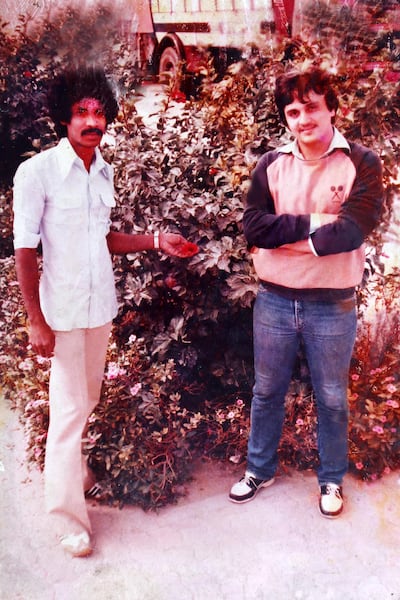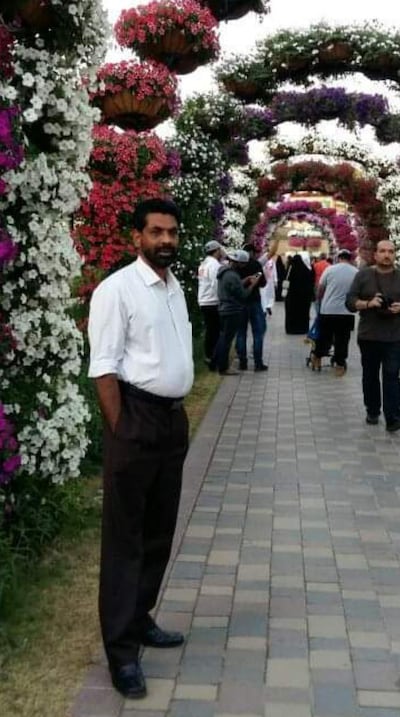PK Vijayan arrived in the UAE from Kerala almost four decades ago in search of a better life.
After his father died young, he dropped out of school to work and looked to the UAE as a land of opportunity.
But he was duped by a Mumbai recruitment agent and ended up in a job to which he was totally unsuited and untrained, on a sun-punished Ruwais construction site about 240 kilometres west of Abu Dhabi.
Mr Vijayan met Lebanese businessman, Izam Al Hussain, who rescued him, gave him a better job and treated him with respect.
Over the years, the men lost touch but Mr Vijayan's daughter – Nisha Ponthathil – has now made an emotional appeal on social media for help to find the man who was kind to her father.
“I have heard so many stories from my father about him since I was a child,” said Ms Ponthathil. “He worked with many people in the Arabian Gulf but I never heard him talk so much about one person.
“My father employs many people back home in Kerala and he is kind and friendly to them. That quality he learnt from this person.”
Mr Vijayan’s story mirrors that of countless others from South Asia who came to the UAE in search of a better life.
It is a tale of loss, emigration and huge personal sacrifice set against the backdrop of economic pain in India.
When his father died, it fell to him to support his mother and six siblings. By the age of 25, an agent in Mumbai promised to bring him to the UAE on a tailor’s visa.
"Agents were everywhere in Mumbai and it was obvious he fell into the trap," Ms Ponthathil said.
Mr Vijayan arrived to a country expanding rapidly on the back on the oil boom. But he was swiftly bundled off to the oil outpost of Ruwais.
In a strange land he was short on options and with a Rs30,000 (Dh1,552 now) loan to pay back, he had no choice but to work under the sun.
“It must have been unimaginable, harrowing even,” said Ms Ponthathil.
“He came from a land of greenery, plants and water to this barren desert. He worked overtime to pay off the loan. The food was also very difficult for him and he was not eating properly.”
But the young man's fortune soon changed.
Mr Vijayan paid off his loan and, through a friend, secured the job of salesman in a fruit and vegetable shop run by Mr Al Hussain in the Adnoc housing complex in Ruwais.
Mr Al Hussain increased his salary and treated him well. Their relationship was something beyond that of an employer and an employee. Not much is known of Mr Al Hussain but it is believed he lived in Abu Dhabi and his family ran an import business.
Mr Vijayan returned to India in 1984, after three years in the UAE. He did not return to the Emirates because of his daughter, despite Mr Al Hussain asking him to.
“I was six or seven,” said Ms Ponthathil. “My mother also refused to send him back because of the visa scam.”
Mr Vijayan completed more stints in Saudi Arabia in the 1990s and Bahrain in 2000 before eventually settling back in Wayanad, Kerala, with his wife. But he and Mr Al Hussain have not met since 1984.
It was on a visit to see Ms Ponthathil and another one of his three daughters in the UAE last year that brought back these warm memories.
“Once again he proved that he never gets tired of telling stories of Izam Al Hussain. Those pictures and the story I heard the umpteenth time have urged me to write this, hoping to find Izam Al Hussain in this viral era of social media,” she wrote in the appeal.
Mr Vijayan is now in his 60s and will return to Abu Dhabi in February. Ms Ponthathil said one frustrating issue is that she has no pictures of Mr Al Hussain, only one of his brother Imad but she is hopeful nonetheless.
It is thought Mr Al Hussain could be in his sixties now.
“So many people from Kerala have even called from Ruwais to say they got the message – some said they will definitely find him if he is still there.
“The response to my appeal has so far been great. Now I want the message to go out of UAE into the region and the world.”




